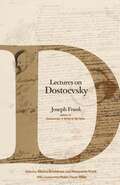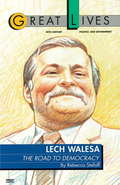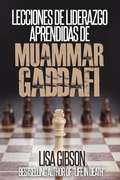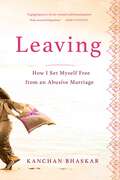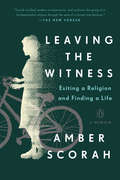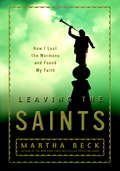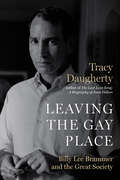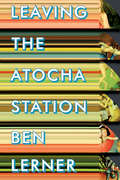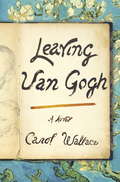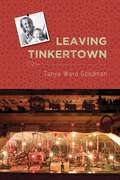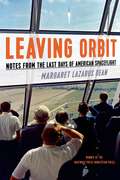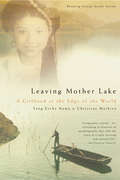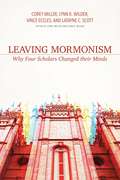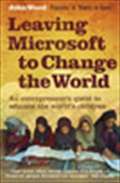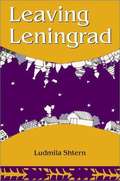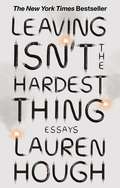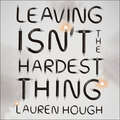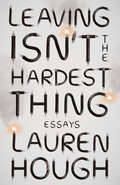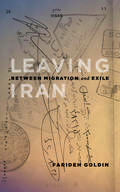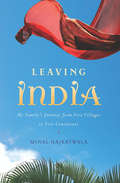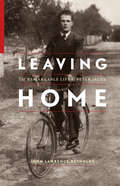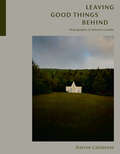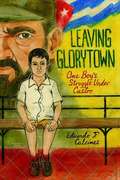- Table View
- List View
Lectures on Religion
by Stephen J. Fleming John W. WelchLectures discussing the role religion played in the founding of America and its continued role up until the early 20th century
Lectures on Dostoevsky
by Joseph FrankFrom the author of the definitive biography of Fyodor Dostoevsky, never-before-published lectures that provide an accessible introduction to the Russian writer's major worksJoseph Frank (1918–2013) was perhaps the most important Dostoevsky biographer, scholar, and critic of his time. His never-before-published Stanford lectures on the Russian novelist's major works provide an unparalleled and accessible introduction to some of literature's greatest masterpieces. Presented here for the first time, these illuminating lectures begin with an introduction to Dostoevsky's life and literary influences and go on to explore the breadth of his career—from Poor Folk, The Double, and The House of the Dead to Notes from Underground, Crime and Punishment, The Idiot, and The Brothers Karamazov. Written in a conversational style that combines literary analysis and cultural history, Lectures on Dostoevsky places the novels and their key characters and scenes in a rich context. Bringing Joseph Frank’s unmatched knowledge and understanding of Dostoevsky's life and writings to a new generation of readers, this remarkable book will appeal to anyone seeking to understand Dostoevsky and his times.The book also includes Frank's favorite review of his Dostoevsky biography, "Joseph Frank's Dostoevsky" by David Foster Wallace, originally published in the Village Voice.
Lech Walesa
by Rebecca StefoffProfiles the remarkable man who began as a shipyard electrician and who became the leader of Poland's Solidarity trade union movement, and who eventually was elected leader of the country.
Lecciones de liderazgo aprendidas de Muamar Gaddafi
by Lisa Gibson Sylwia EnglertDos vidas chocan cuando una víctima del terrorismo se reúne y perdona al terrorista que asesinó a su hermano A veces las lecciones más importantes de la vida vienen de los lugares más inverosímiles Probablemente te estés preguntando, ¿qué tipo de lecciones de liderazgo se puede aprender de uno de los terroristas más notorios del mundo? Después de todo, ¿él pasará a la historia como uno de los dictadores más brutales y malos a causa de su maldad? Este será probablemente uno de los libros más inusuales sobre el liderazgo que podrás leer. Es tanto sobre el viaje de la autora, Lisa Gibson, como de la vida de Muamar el Gadafi. El 21 de diciembre de 1988 sus vidas se cruzaron, cuando el líder libio asesinó al hermano de Lisa. A pesar de lo que hizo, ella fue a reunirse con él y dedicó su vida a ayudar a la gente del país que él trató con tanta brutalidad. Incluso si te parece que no podía haber nada que aprender sobre el liderazgo de un hombre como Gadafi, profundiza el libro de Lisa y siéntete inspirado y desafiado. Descubre que en su viaje de liderazgo se trata tanto de aprender «qué no hacer», como de aprender lo «qué hacer». Lisa Gibson es una mediadora de conflictos globales, abogada y oradora pública internacionalmente reconocida. Ella es la autora premiada de los libros más vendidos, como son: Life In Death: A Journey From Terrorism To Triumph; Releasing The Chains: Timeless Wisdom On How To Forgive Anyone For Anything y la coautora de The Expert Success Solution. Lisa recibió la distinción al ser elegida entre los Diez Jóvenes Estadounidenses Destacados y Ejemplo del Amor y del Perdón. Apareció como invitada en la CNN, la BBC, la MSNBC, el programa Hour of Power y muchos más. Género: BIOGRAFÍA & AUTOBIOGRAFÍA / General Género secundario: CIENCIAS POLÍTICAS / General Idioma: español Palabras: 45949
Leaving: How I Set Myself Free from an Abusive Marriage
by Kanchan BhaskarRaised by two loving parents in New Delhi, India, Kanchan Bhaskar has always been taught that marriage means companionship, tenderness, and mutual respect—so when she enters into an arranged marriage, this is the kind of partnership she anticipates with her new, seemingly wonderful, husband. But after they marry, she quickly discovers that his warmth is deceptive—that the man beneath the bright, charming façade is actually a narcissistic, alcoholic, and violent man.Trapped in a nightmare, Kanchan pleads with her husband to seek help for his issues, but he refuses. Meanwhile, Indian law is not on her side, and as the years pass, she finds herself with three children to protect—three children she fears she will lose custody of if she leaves. Almost overnight, she finds herself transformed into a tigress who will do whatever it takes to protect her cubs, and she becomes determined to free them from their toxic father. But it&’s not until many years later, when the family of five moves from India to the United States, that Kanchan is presented with a real opportunity to leave him—and she takes it.Chronicling Kanchan&’s gradual climb out of the abyss, little by little, day by day, Leaving is the empowering story of how—buoyed by her deep faith in a higher power and single-minded in her determination to protect her children best—she fought relentlessly to build a ramp toward freedom from her abuser. In this memoir, Kanchan clearly lays out the tools and methods she utilized in her pursuit of liberation—and reveals how belief in self and belief in the Universe can not only be weapons of escape but also beautiful foundations for a triumphant, purpose-driven life.
Leaving the Witness: Exiting a Religion and Finding a Life
by Amber Scorah<P><P>A riveting memoir of losing faith and finding freedom while a covert missionary in one of the world's most restrictive countries. <P><P>A third-generation Jehovah's Witness, Amber Scorah had devoted her life to sounding God's warning of impending Armageddon. She volunteered to take the message to China, where the preaching she did was illegal and could result in her expulsion or worse. Here, she had some distance from her community for the first time. Immersion in a foreign language and culture--and a whole new way of thinking--turned her world upside down, and eventually led her to lose all that she had been sure was true. <P><P>As a proselytizer in Shanghai, using fake names and secret codes to evade the authorities' notice, Scorah discreetly looked for targets in public parks and stores. To support herself, she found work at a Chinese language learning podcast, hiding her real purpose from her coworkers. Now with a creative outlet, getting to know worldly people for the first time, she began to understand that there were other ways of seeing the world and living a fulfilling life. When one of these relationships became an "escape hatch," Scorah's loss of faith culminated in her own personal apocalypse, the only kind of ending possible for a Jehovah's Witness. <P><P>Shunned by family and friends as an apostate, Scorah was alone in Shanghai and thrown into a world she had only known from the periphery--with no education or support system. <P><P>A coming of age story of a woman already in her thirties, this unforgettable memoir examines what it's like to start one's life over again with an entirely new identity. It follows Scorah to New York City, where a personal tragedy forces her to look for new ways to find meaning in the absence of religion. <P><P>With compelling, spare prose, Leaving the Witness traces the bittersweet process of starting over, when everything one's life was built around is gone.
Leaving the Saints: How I Lost the Mormons and Found My Faith
by Martha BeckIn a thoughtful, moving, and ultimately inspiring memoir, bestselling author Martha Beck chronicles her difficult decision to leave behind her Mormon childhood and upbringing, and reveals her lifetime struggle to overcome a dark secret buried in her childhood. While growing up within the Mormon Church, Martha Beck was raised in a home frequented by the Church's high elders and her existence was framed by their strict code of conduct. When her son was born with Down syndrome, she and her husband left their graduate programmes at Harvard to return to Provo, Utah, and the supportive Mormon community of Martha's youth. But after Martha began teaching at Brigham Young University, she saw at first hand the Church's ruthlessness as it silenced dissidents and masked truths that contradicted its beliefs. Most troubling of all, Martha was jolted into recovering memories of sexual abuse at the hands of one of the Church's most respected leaders. Filled with great insight and Martha Beck's celebrated humour and entertaining wit, Leaving the Saints is an unforgettable autobiography that offers a rare glimpse inside one of the world's most secretive religions while telling a profoundly moving story of personal courage, survival, and the transformative power of spirituality.
Leaving the Gay Place: Billy Lee Brammer and the Great Society
by Tracy Daugherty&“By turns a strong, clear biography (with shades of rock n roll memoir), a poetic ode to various places and people in midcentury Texas and an oral history.&” —Texas Observer Acclaimed by critics as a second F. Scott Fitzgerald, Billy Lee Brammer was once one of the most engaging young novelists in America. When he published his first and only novel, The Gay Place, in 1961, literary luminaries such as David Halberstam, Willie Morris, and Gore Vidal hailed his debut. Halberstam called it &“a classic . . . [A] stunning, original, intensely human novel inspired by Lyndon Johnson . . . It will be read a hundred years from now.&” More recently, James Fallows, Gary Fisketjon, and Christopher Lehmann have affirmed The Gay Place&’s continuing relevance, with Lehmann asserting that it is &“the one truly great modern American political novel.&” Leaving the Gay Place tells a sweeping story of American popular culture and politics through the life and work of a writer who tragically exemplifies the highs and lows of the country at mid-century. Tracy Daugherty follows Brammer from the halls of power in Washington, DC, where he worked for Senate majority leader Johnson, to rock-and-roll venues where he tripped out with Janis Joplin, and ultimately to back alleys of self-indulgence and self-destruction. Constantly driven to experiment with new ways of being and creating—often fueled by psychedelics—Brammer became a cult figure for an America on the cusp of monumental change, as the counterculture percolated through the Eisenhower years and burst out in the sixties. In Daugherty&’s masterful recounting, Brammer&’s story is a quintessential American story, and Billy Lee is our wayward American son.
Leaving the Atocha Station
by Ben Lerner<P>Adam Gordon is a brilliant, if highly unreliable, young American poet on a prestigious fellowship in Madrid, struggling to establish his sense of self and his relationship to art. What is actual when our experiences are mediated by language, technology, medication, and the arts? <P>Is poetry an essential art form, or merely a screen for the reader's projections? <P>Instead of following the dictates of his fellowship, Adam's "research" becomes a meditation on the possibility of the genuine in the arts and beyond: are his relationships with the people he meets in Spain as fraudulent as he fears his poems are? <P>A witness to the 2004 Madrid train bombings and their aftermath, does he participate in historic events or merely watch them pass him by? <P>In prose that veers between the comic and tragic, the self-contemptuous and the inspired, Leaving the Atocha Station is a portrait of the artist as a young man in an age of Google searches, pharmaceuticals, and spectacle. <P>Born in Topeka, Kansas, in 1979, Ben Lerner is the author of three books of poetry The Lichtenberg Figures, Angle of Yaw, and Mean Free Path. He has been a finalist for the National Book Award and the Northern California Book Award, a Fulbright Scholar in Spain, and the recipient of a 2010-2011 Howard Foundation Fellowship. In 2011 he became the first American to win the Preis der Stadt Münster für Internationale Poesie. Leaving the Atocha Station is his first novel.
Leaving Van Gogh
by Carol WallaceIn the summer of 1890, in the French town of Auvers-sur-Oise, Vincent van Gogh shot himself in the chest with a revolver. He died two days later, at the age of thirty-seven, largely unknown despite having completed over two thousand works of art that would go on to become some of the most important and valued in the world. In this riveting novel, Carol Wallace brilliantly navigates the mysteries surrounding the master artist's death, relying on meticulous research to paint an indelible portrait of Van Gogh's final days--and the friendship that may or may not have destroyed him. Telling Van Gogh's story from an utterly new perspective--that of his personal physician, Dr. Gachet, specialist in mental illness and great lover of the arts--Wallace allows us to view the legendary painter as we've never seen him before. In our narrator's eyes, Van Gogh is an irresistible puzzle, a man whose mind, plagued by demons, poses the most potentially rewarding challenge of Gachet's career. Wallace's narrative brims with suspense and rich psychological insight as it tackles haunting questions about Van Gogh's fate. A masterly, gripping novel that explores the price of creativity, Leaving Van Gogh is a luminous story about what it means to live authentically, and the power and limits of friendship.From the Hardcover edition.
Leaving Tinkertown (Literature and Medicine Series)
by Tanya Ward GoodmanWhen Tanya Ward Goodman came home to New Mexico to visit her dad at the end of 1996, he was fifty-five years old and just beginning to show symptoms of the Alzheimer&’s disease that would kill him six years later. Early onset dementia is a shock and a challenge to every family, but the Wards were not an ordinary family. Ross Ward was an eccentric artist and collector whose unique museum, Tinkertown, brought visitors from all over the world to the Sandia Mountains outside Albuquerque. In this book Tanya tells Ross&’s story and her own, sharing the tragedy and the unexpected comedy of caring for this funny, stubborn man who remained a talented artist even as he changed before his family&’s eyes.
Leaving Orbit: Notes from the Last Days of American Spaceflight
by Margaret Lazarus DeanWinner of the Graywolf Press Nonfiction Prize, a breathtaking elegy to the waning days of human spaceflight as we have known itIn the 1960s, humans took their first steps away from Earth, and for a time our possibilities in space seemed endless. But in a time of austerity and in the wake of high-profile disasters like Challenger, that dream has ended. In early 2011, Margaret Lazarus Dean traveled to Cape Canaveral for NASA's last three space shuttle launches in order to bear witness to the end of an era. With Dean as our guide to Florida's Space Coast and to the history of NASA, Leaving Orbit takes the measure of what American spaceflight has achieved while reckoning with its earlier witnesses, such as Norman Mailer, Tom Wolfe, and Oriana Fallaci. Along the way, Dean meets NASA workers, astronauts, and space fans, gathering possible answers to the question: What does it mean that a spacefaring nation won't be going to space anymore?
Leaving Mother Lake: A Girlhood at the Edge of the World
by Yang Erche Namu Christine MathieuLeaving Mother Lake is the extraordinary story of Yang Erche Namu - a girl growing up in the borderlands between Tibet and China, who left her remarkable childhood behind for the bright lights of Shanghai and singing stardom. Namu's home is in an area so primitive that during the Cultural Revolution the Red Guards arrived and left because there was nothing to destroy. When Namu was a small child, her mother tried to give her away three times because she would not stop crying. Each time she was returned. As she grew up, she clashed repeatedly with her equally fierce mother until the arrival of a Chinese official, looking for talented singers. Namu was selected for a singing competition in the nearest city - eight hours away - which, to her astonishment, she won. She realised she had a taste for the outside world and, despite her mother's protestations, she decided to run away Leaving Mother Lake is the lyrical story of the girl who grew out of her rural beginnings, battling against the odds to achieve extraordinary success.
Leaving Mormonism: Why Four Scholars Changed Their Minds
by Latayne Scott Corey Miller Lynn Wilder Vince Eccles"'As former Mormons turned evangelical Christians, all of whom are accomplished scholars, the four contributors to this volume provide a unique and authoritative corrective. Each shares his or her story of growing up in the Mormon Church, and how biblical, theological, moral, or scientific issues forced them to eventually leave Mormonism. The writers draw on the expertise of their respective academic fields to show how Mormon teachings and practice fall short biblically and rationally. "'They also address common objections raised by former Mormons who have lost faith altogether and have embraced atheism or agnosticism--especially under the influence of 'new atheists' like Richard Dawkins and Christopher Hitchens.'" Even for non-Mormons or for non-ex-Mormons, this book provides powerful Christian apologetics which people need to hear and understand in this secular culture in which we live especially at the college and university level. Besides giving ex-Mormons a Christian alternative, another reason that the writers wrote this book was to give Christian students the understanding and tools necessary to help them defend their faith in these secular environments. Also, often people have doubts about their faith and this book will help them deal with their doubts effectively. At the end of each entry, the authors provide extensive notes, which not only substantiate their facts and thinking, but provide the reader with additional resources.
Leaving Microsoft to Change the World: An Entrepeneur's Odyssey to Educate the World's Children
by John E. WoodsA trip to Nepal convinced Wood to divert the energy he was devoting to Microsoft into a cause that needed addressing - educating all children
Leaving Leningrad
by Ludmila ShternAlthough women writers have held a conspicuous place in the history of modern Russian literature, they have been slow to find their true voices in exile. Ludmila Shtern, a geologist/writer who emigrated to the US from the Soviet Union in 1975, offers a completely fresh, unsentimental look at daily life in the former Soviet Union and the US in the second half of the 20th century. Her memoir, part comic bildungsroman, part picaresque adventure, shows its heroine, Tatyana Dargis, growing up in the USSR, falling in love, falling afoul of the KGB, and finally emigrating to the US where new absurdities (capitalist rather than communist in nature) prevail. An amalgam of bittersweet understatement and mordant wit, Shtern's prose is shaped by her ear for a wide range of human voices and the stories they tell, and by her eye for the grotesqueries and savagely funny pain of modern life.
Leaving Isn't the Hardest Thing: The New York Times bestseller
by Lauren Hough'Hough's conversational prose reads like the voice of a blues singer, taking breaks between songs to narrate her heartbreak in verse, cajoling her audience to laugh to keep from crying' - The New York Times'Hough's writing will break your heart' - Roxane Gay, author of Difficult Women'Each one told with the wit of David Sedaris, and the insight of Joan Didion' - Telegraph 'This moving account of resilience and hard-earned agency brims with a fresh originality' - Publishers WeeklySearing and extremely personal essays from the heart of working-class America, shot through with the darkest elements the country can manifest - cults, homelessness, and hunger - while discovering light and humor in unexpected corners.As an adult, Lauren Hough has had many identities: an airman in the U.S. Air Force, a cable guy, a bouncer at a gay club. As a child, however, she had none. Growing up as a member of the infamous cult The Children of God, Hough had her own self robbed from her. The cult took her all over the globe but it wasn't until she finally left for good that Lauren understood she could have a life beyond "The Family."Along the way, she's loaded up her car and started over, trading one life for the next. Here, as she sweeps through the underbelly of America--relying on friends, family, and strangers alike--she begins to excavate a new identity even as her past continues to trail her and color her world, relationships, and perceptions of self.At once razor-sharp, profoundly brave, and often very, very funny, the essays in Leaving Isn't the Hardest Thing interrogate our notions of ecstasy, queerness, and what it means to live freely. Each piece is a reckoning: of survival, identity, and how to reclaim one's past when carving out a future.
Leaving Isn't the Hardest Thing: The New York Times bestseller
by Lauren HoughSearing and extremely personal essays from the heart of working-class America, shot through with the darkest elements the country can manifest - cults, homelessness, and hunger - while discovering light and humor in unexpected corners.'Hough's writing will break your heart' - Roxane Gay, author of Difficult Women'An edgy and unapologetic memoir in essays' - Kirkus Reviews'This moving account of resilience and hard-earned agency brims with a fresh originality' - Publishers WeeklySearing and extremely personal essays from the heart of working-class America, shot through with the darkest elements the country can manifest - cults, homelessness, and hunger - while discovering light and humor in unexpected corners.As an adult, Lauren Hough has had many identities: an airman in the U.S. Air Force, a cable guy, a bouncer at a gay club. As a child, however, she had none. Growing up as a member of the infamous cult The Children of God, Hough had her own self robbed from her. The cult took her all over the globe--to Germany, Japan, Texas, Chile--but it wasn't until she finally left for good that Lauren understood she could have a life beyond "The Family."Along the way, she's loaded up her car and started over, trading one life for the next. She's taken pilgrimages to the sights of her youth, been kept in solitary confinement, dated a lot of women, dabbled in drugs, and eventually found herself as what she always wanted to be: a writer. Here, as she sweeps through the underbelly of America--relying on friends, family, and strangers alike--she begins to excavate a new identity even as her past continues to trail her and color her world, relationships, and perceptions of self.At once razor-sharp, profoundly brave, and often very, very funny, the essays in Leaving Isn't the Hardest Thing interrogate our notions of ecstasy, queerness, and what it means to live freely. Each piece is a reckoning: of survival, identity, and how to reclaim one's past when carving out a future.(P) 2021 Hodder & Stoughton Ltd
Leaving Isn't the Hardest Thing: Essays
by Lauren HoughSearing and extremely personal essays, shot through with the darkest elements America can manifest, while discovering light and humor in unexpected corners. <P><P>As an adult, Lauren Hough has had many identities: an airman in the U.S. Air Force, a cable guy, a bouncer at a gay club. As a child, however, she had none. Growing up as a member of the infamous cult The Children of God, Hough had her own self robbed from her. The cult took her all over the globe--to Germany, Japan, Texas, Chile—but it wasn't until she finally left for good that Lauren understood she could have a life beyond "The Family." <P><P>Along the way, she's loaded up her car and started over, trading one life for the next. She's taken pilgrimages to the sights of her youth, been kept in solitary confinement, dated a lot of women, dabbled in drugs, and eventually found herself as what she always wanted to be: a writer. Here, as she sweeps through the underbelly of America—relying on friends, family, and strangers alike—she begins to excavate a new identity even as her past continues to trail her and color her world, relationships, and perceptions of self. <P><P>At once razor-sharp, profoundly brave, and often very, very funny, the essays in Leaving Isn't the Hardest Thing interrogate our notions of ecstasy, queerness, and what it means to live freely. Each piece is a reckoning: of survival, identity, and how to reclaim one's past when carving out a future.
Leaving Iran: Between Migration and Exile
by Goldin FaridehIn 1976, at the age of twenty-three, Farideh Goldin left Iran in search of her imagined America. She sought an escape from the suffocation she felt under the cultural rules of her country and the future her family had envisioned for her. While she settled uneasily into American life, the political unrest in Iran intensified and in February of 1979, Farideh’s family was forced to flee Iran on the last El-Al flights to Tel Aviv. They arrived in Israel as refugees, having left everything behind including the only home Farideh’s father had ever known. Baba, as Farideh called her father, was a well-respected son of the chief rabbi and dayan of the Jews of Shiraz. During his last visit to the United States in 2006, he handed Farideh his memoir that chronicled the years of his life after exile: the confiscation of his passport while he attempted to return to Iran for his belongings, the resulting years of loneliness as he struggled against a hostile bureaucracy to return to his wife and family in Israel, and the eventual loss of the poultry farm that had supported his family. Farideh translated her father’s memoir along with other documents she found in a briefcase after his death. Leaving Iran knits together her father’s story of dislocation and loss with her own experience as an Iranian Jew in a newly adopted home. As an intimate portrait of displacement and the construction of identity, as a story of family loyalty and cultural memory, Leaving Iran is an important addition to a growing body of Iranian–American narratives.
Leaving India: My Family's Journey from Five Villages to Five Continents
by Minal HajratwalaThe PEN Award–winning chronicle of the Indian diaspora told through the stories of the author&’s own family. In this &“rich, entertaining and illuminating story,&” Minal Hajratwala mixes history, memoir, and reportage to explore the collisions of choice and history that led her family to emigrate from India (San Francisco Chronicle). &“Meticulously researched and evocatively written&” (The Washington Post), Leaving India looks for answers to the eternal questions that faced not only Hajratwala&’s own Indian family but all immigrants, everywhere: Where did we come from? Why did we leave? What did we give up and gain in the process? Beginning with her great-grandfather Motiram&’s original flight from British-occupied India to Fiji, where he rose from tailor to department store mogul, Hajratwala follows her ancestors across the twentieth-century to explain how they came to be spread across five continents and nine countries. As she delves into the relationship between personal choice and the great historical forces—British colonialism, apartheid, Gandhi&’s salt march, and American immigration policy—that helped shape her family&’s experiences, Hajratwala brings to light for the very first time the story of the Indian diaspora. A luminous narrative from &“a fine daughter of the continent, bringing insight, intelligence and compassion to the lives and sojourns of her far-flung kin,&” Leaving India offers a deeply intimate look at what it means to call more than one part of the world home (Alice Walker).
Leaving Home, A Memoir
by Art BuchwaldThe early years of a humorist who was raised in foster homes.
Leaving Home
by John Lawrence ReynoldsPetro (Peter) Jacyk survived two of the most horrendous events of the 20th century: the Ukrainian famine of the 1930s, instigated by Stalin and responsible for the deaths of untold millions, and waves of invasion and slaughter from Soviet Russia and Nazi Germany. Fleeing postwar Europe in 1949, he arrived in Canada with seven dollars in his pocket and horrific images in his memory. His adopted country would inspire a deep and lifelong love in Jacyk. Here at last, as he put it, he was "free to live and free to succeed." Through the Toronto building and land development firm he founded, he established himself as an economic and cultural powerhouse. Exacting in his dealings with others, yet a generous mentor, he sought excellence in all of his pursuits. In time, the man who had begun as a "poor-penny immigrant" became one of the country's most prominent philanthropists, donating substantial portions of his wealth to projects dedicated to Ukrainian history, language, and culture. Universities such as Harvard, Columbia, and the University of Toronto benefited from his largesse. Leaving Home celebrates the life of a remarkable man determined to make a positive impact on an often-hostile world.
Leaving Good Things Behind: Photographs of Atlantic Canada
by Darren CalabreseWhen a family tragedy pulled photojournalist Darren Calabrese back to Atlantic Canada, the region both he and his wife once called home, he was confronted with a sense of profound grief. But, on returning to the rural property where he grew up, as a new father, he rediscovered an appreciation for the geographies, histories, and people of New Brunswick, Nova Scotia, Prince Edward Island, and Newfoundland and Labrador, turning his lens to explore the tension between the perseverance of tradition and the inevitability of change.Darren&’s work led him into communities across the eastern provinces, who welcomed him to document the inextricable relationship between people, their stories, and the landscapes—equally beautiful and harsh—where they live and work. The result is an astonishing, evocative collection of curated photographs and archival images, with personal essays on family, coming home, loss, and his experiences exploring the region woven in throughout.Elegant, spare, and revelatory at every turn, Leaving Good Things Behind shines a light on both the challenges and joys of the places we live.
Leaving Glorytown: One Boy's Struggle under Castro
by Eduardo F. CalcinesIn this absorbing memoir, by turns humorous and heartbreaking, Eduardo Calcines recounts his boyhood and chronicles the conditions that led him to wish above all else to leave behind his beloved extended family and his home for a chance at a better future.

